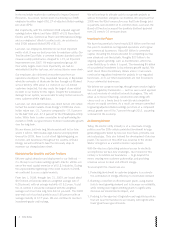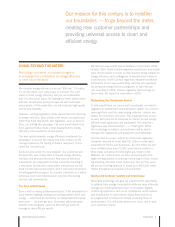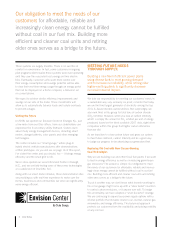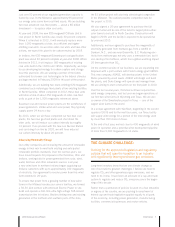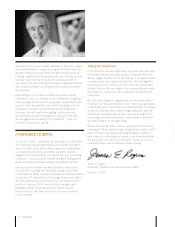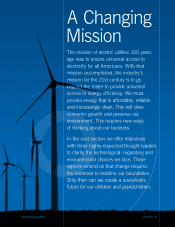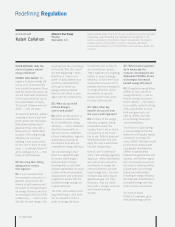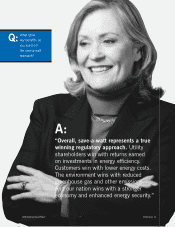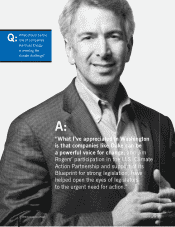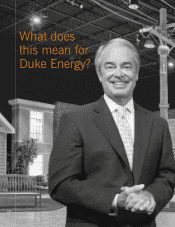Duke Energy 2008 Annual Report Download - page 16
Download and view the complete annual report
Please find page 16 of the 2008 Duke Energy annual report below. You can navigate through the pages in the report by either clicking on the pages listed below, or by using the keyword search tool below to find specific information within the annual report.
DUKE ENERGY: How do you
view Duke Energy in terms
of the way it is trying to
redefine its boundaries to
address climate change?
FRED KRUPP: I appreciate
Duke taking a constructive
role in searching for answers
and solutions on national
climate policy. We know we’re
going to disagree on some
things, but the idea that
here’s a company that’s
willing to join the voices of
leadership on this issue and
say, “Yes, this is how we can
do it,” instead of the more
typical, “No, let’s stand pat,”
is very much appreciated.
DE: What should be the
role of companies like
Duke Energy in meeting
the climate challenge?
FK: As one of the nation’s
largest emitters of greenhouse
gases, Duke Energy has an
obligation to be engaged in
finding and implementing
solutions to the problem.
The decisions you make
every day about what plants
to run and what plants to
build are decisions that
will have implications for
generations.
What I’ve appreciated in
Washington is that companies
like Duke can be a powerful
voice for change, and Jim
Rogers’ participation in the
U.S. Climate Action
Partnership and support of
its Blueprint for strong legisla-
tion, have helped open the
eyes of legislators to the
urgent need for action.
DE: In your opinion,
what are the minimum
requirements for federal
climate legislation?
FK: Any climate legislation
needs to be a cap-and-trade
program that starts with a
mandatory declining cap that
gets us 20 percent reductions
in the nation’s emissions by
2020, 42 percent reductions
by 2030 and 80 percent
by 2050.
DE: How should such
legislation address energy
efficiency and the technology
options of carbon capture
and storage?
FK: In the near term, there’s
a lot to be gained from
investing in energy efficiency,
as the cleanest power plant is
the one we don’t have to build
— where every dollar we
spend stays at home.
One of the reasons that I
believe those who care about
the environment should be
supporting carbon capture
is because if we can make
it viable, we raise our ability
to lower carbon emissions
much faster than otherwise
by cutting emissions from
existing power plants.
In terms of nuclear energy,
the fact that climate change
is so severe means that we
can’t afford to rule out any
lower carbon source of
energy, including nuclear.
But before we consider
expanding the use of nuclear
power, we need to solve
the real problems of waste
disposal, security and cost.
DE: Do you think we’ll have
climate legislation in time
for the Copenhagen Climate
Conference this December,
or is 2010 more likely?
FK: I think we’ve got a good
chance to get legislation in
2009. The big new factor
is we now have a president
who not only believes we
need climate legislation for
the sake of the climate, but
he understands we need
climate legislation for the sake
of the economy. That makes
me believe it could get done
this year, but it will take much
hard work to make it happen.
DE: How should such
legislation protect consum-
ers, especially those in
the two dozen or so states
whose electricity is primarily
generated from burning coal?
FK: It’s important in the
transition to a low-carbon
economy that we treat all
consumers, including
consumers in states that are
now heavily dependent on
coal, in an equitable way
to ease the transition.
DE: How can we better
educate consumers about
how such a market-based
system would work?
FK: Any solution starts with
firm limits on global warming
pollution. A market solution
implements these legal limits
in a way that rewards innova-
tors so we create jobs, it
protects the public at the
lowest cost, and has real
regulation of the market
that achieves healthy air.
For more of Fred Krupp’s
interview, go to
www.duke-energy.com/ar.
Redefining Climate Legislation
An interview with
Fred Krupp
Environmental Defense Fund
President
New York, N.Y.
Fred Krupp is widely recognized as the foremost champion of harnessing
market forces for environmental ends. This approach has become the
leading model for solving global warming. In his 24 years as head of EDF,
Krupp has overseen EDF’s growth from a small nonprofit into a recognized
worldwide leader in the environmental movement.
14 Duke Energy


